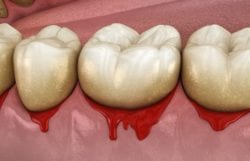Maintaining healthy gums is important, not only for dental health but for a good quality of life. Changes in gum health can also be an indicator of changes in systemic health such as diabetes, cancer, or auto-immune disorders.
Preventive dental care plays an important role in maintaining gum health. Dr. Brenda Paulen educates her patients on the link between oral health and overall health and encourages maintaining healthy gums.

Can Gum Disease Be Reversed?
The severity of gum disease can vary depending on how far the disease has progressed. The earliest stage, known as gingivitis, only causes mild inflammation, and it can be reversed with good oral hygiene and teeth cleanings.
The more advanced stage is a chronic condition called periodontitis. Dr. Paulen can help catch early signs of gingivitis at your regular cleanings and checkups. In most cases, you can cure gum at this stage. However, as the disease progresses and reaches periodontitis, it can’t be cured, only treated
My Gum Disease Has Progressed – What Kind of Treatment Will help Me?
Patients whose gingivitis has progressed into periodontal disease will often need to undergo a dental procedure called deep cleaning (also known as root scaling and planning). In this procedure, the dentist will scrape away the plaque and tartar off the teeth above and below the gum line.
The root of the teeth will also be cleaned of plaque and tartar build-up. Surgical treatments may be prescribed for the most severe cases of periodontal disease.
The two most common dental surgical procedures to halt severe gum disease are flap surgery and bone and tissue grafts.
Flap surgery is where the dentist will lift back the gums and remove the built-up tartar underneath. Flap surgery not only removes the tartar build-up, but it also reduces the depth of the periodontal pocket, making the area easier to clean and maintain in the future.
Bone and tissue grafts aim to rebuild and regrow damaged bone and gum tissue that has been weakened or destroyed from untreated periodontal disease. The procedures involve inserting small pieces of mesh-like material to keep the gum tissue from growing into the areas of bone loss.
Signs of Gum Disease
Treating early-stage gum disease is a simple process. However, once gum disease progresses, those risk factors come into play. It can also lead to problems such as receding gums and tooth loss.
- Bleeding when you brush your teeth or floss
- Red or swollen gums
- Constant bad breath
- Mouth sores
- Receding gums
- Loose or shifting teeth
- A change in fit if you wear dentures
Dr. Paulen makes oral health her priority and helps make sure your oral health is on the right track. Call us or schedule an appointment online if you’re noticing any of these signs.
